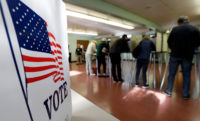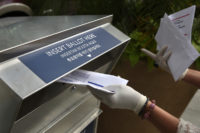Voter ID
Requiring voters to prove they are who they say they are in order to cast a ballot is a simple, common-sense measure that helps ensure honest elections.
Opponents of photo ID falsely charge that such requirements discriminate against poor and minority voters. Each time this claim has been used in the courts, plaintiffs have failed to produce evidence of any individual who was actually denied the right to vote for lack of a photo ID. Despite this fact, and that all demographic groups including African-Americans support voter ID laws, accusations of Jim Crow, the racist system that disenfranchised Southern blacks for generations, continue to be hurled with abandon.
The Supreme Court has stated that because voter ID is free, the inconveniences of going to the Bureau of Motor Vehicles, gathering applicable documents, or posing for a photograph are not substantial burdens on most voters’ right to vote. Nor do they represent a significant increase over the usual burdens of voting — registering or driving to a polling place. If people show up without an ID, they can cast a provisional ballot and bring in their ID later.
The Supreme Court found that the interests in requiring voter ID are unquestionably relevant in protecting the integrity and reliability of the electoral process as part of a nationwide effort to improve and modernize election procedures criticized as antiquated and inefficient.
In Crawford v. Marion County Election Board (2008), the Supreme Court also noted the particular interest in preventing voter fraud in response to the problem of voter registration rolls with a large number of names of persons who are either deceased or no longer live in Indiana. While the trial record contained no evidence that “in-person voter impersonation at polling places had actually occurred in Indiana, such fraud had occurred in other parts of the country, and Indiana’s own experience with voter fraud in a 2003 mayoral primary demonstrates a real risk that voter fraud could affect a close election’s outcome.”
The Supreme Court noted that there was no question that the state had a legitimate and important interest in counting only eligible voters’ ballots. Lastly the Court noted that the state interest in protecting public confidence in elections also has independent importance because such voter confidence encourages citizen participation in the democratic process.
Using a photo ID for voting is a central recommendation from the bipartisan Commission on Federal Election Reform, headed by former President Jimmy Carter and former Secretary of State James Baker. Here’s what the commission’s official report says:
“A good registration list will ensure that citizens are only registered in one place, but election officials still need to make sure that the person arriving at a polling site is the same one that is named on the registration list. In the old days and in small towns where everyone knows each other, voters did not need to identify themselves. But in the United States, where 40 million people move each year, and in urban areas where some people do not even know the people living in their own apartment building let alone their precinct, some form of identification is needed.”
“The electoral system cannot inspire public confidence if no safeguards exist to deter or detect fraud or to confirm the identity of voters. Photo IDs currently are needed to board a plane, enter federal buildings, and cash a check. Voting is equally important.”
ACRU Commentary
Voter Fraud Is an American Tradition
6/4: The Daily Signal podcast examines the history of voter fraud in America.
Adams: “Controversial” New Hampshire Law Is Common Sense
5/17: ACRU Policy Board Member J. Christian Adams explains why the controversial New Hampshire voter laws are perfectly reasonable.
Federal Judge Dismisses Lawsuit Against the Photo ID Law
4/25: Alabama Secretary of State John H. Merrill is excited to announce that U.S. District Judge L. Scott Coogler has issued a 69-page ruling dismissing a lawsuit regarding Alabama’s Photo ID Law.
Add These Voter Fraud Cases to the Growing List
4/19: Despite the lack of media coverage, evidence of election fraud continues to mount.
Is Universal Voter Registration Constitutional?
3/28: Globe columnist Jeff Jacoby makes the argument that universal voter registration is a terrible idea.
Requiring ID at the Polls Is the Best Way to Secure Maryland Elections
3/2: Rather than spending money on preventing foreign tampering, Maryland should shore up election integrity by requiring identification at the polls.
News
Groundbreaking National Voter Roll Study Reveals Alarming Trends as States Prepare to Vote by Mail
Our colleagues at PILF have performed an extensive nationwide study and found U.S. voter rolls are full of errors, deceased voters and duplicate registrations. They found nearly half a million problems -- how many remain undiscovered?
Pennsylvania – watchdog group finds 800K questionable registered on county voter rolls
Judicial Watch announced today that it filed a lawsuit against Pennsylvania and three of its counties for failing to make reasonable efforts to remove ineligible voters from their rolls as required by the federal National Voter Registration Act of 1993 (NVRA).
North Carolina and nationwide – liberal group mails applications partially filled out
A voter registration group is sending hundreds of thousands of mail-in and absentee ballot applications to voters in states that do not automatically mail the ballot applications themselves.
Indiana – Democrat precinct chair accused of ‘pre-marking” 300 ballot applications
A trial date has been set for an Evansville woman charged with pre-marking absentee ballot applications before this past June's Indiana primary.
Another dead voter in New Mexico
It’s not funny, actually. A grieving New Mexico widow visited her county election office to ask them to stop sending absentee ballots to her deceased husband who had passed away the year before in another [...]
A shocking admission about institutionalized vote fraud
This story gave us chills. It proves what ACRU and our supporters have noted for months -- vote fraud is not just rampant — but organized. Voting in person is the solution to making sure someone doesn’t slap a strip over duct tape over YOUR vote by fraudulently submitting others. We fear this unprecedented admission of felony vote tampering is just the tip of a very disturbing iceberg. As Lori says, “be a VIP!.”













